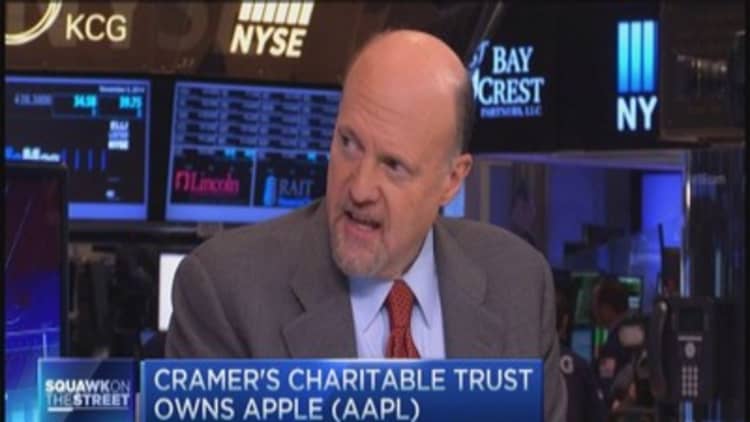
Apple has never looked stronger. Its latest smartphone is a smash hit, its share price is at a record high and it's sitting on $155 billion in cash. So why hit up European bond investors for money?
The company held calls Monday with debt investors about a potential bond sale including a component denominated in euros, according to a person familiar with the matter.
On Tuesday, Apple priced its first non-dollar bonds at record levels: An eight-year bond with a 1.082 percent yield and a 12-year with a yield of 1.671 percent.
While a euro bond might look like an unusual move, there are several good reasons for Apple to move now. First, the company can't actually use much of its cash without triggering tax obligations. While Apple had $155 billion in cash on its balance sheet at the end of September, $137 billion of that is held by foreign subsidiaries.
The company has said that it would probably need to pay repatriation taxes on most of that money if it tries to bring it back to the U.S.
Apple may also need more cash soon. The company has already spent $94 billion on dividends and share repurchases out of a $130 billion program. It's expected that it'll spend the remaining $36 billion on more dividends and buybacks between now and the end of 2015, when the program is scheduled to end.
And some investors want even more aggressive buybacks. Billionaire Carl Icahn, who owns 0.9 percent of Apple's outstanding shares, has urged the company to spend far more—and to do so as soon as possible. Indeed, Apple's shares rose 1.6 percent to a record Monday, possibly reflecting hopes for a bigger buyback program. Apple didn't respond to a request for comment from CNBC.
Euro-denominated bonds may make more financial sense than selling more bonds in U.S. dollars. In April 2013, Apple sold its first bonds in almost 20 years with a $17 billion offering—setting a record at the time for a corporate bond deal. It followed up on that with a $12 billion bond offering in April of this year.
Fixed income professionals say that Apple's $29 billion in combined U.S. dollar bond sales is a large number even for a strong company like Apple. Indeed, Apple's bonds swooned in 2013 when the broader bond market fell. Bond investors sometimes choose bonds that are liquid and easy to sell when a broad market move occurs. Going to Europe would allow Apple to tap a new investor base.
Read MoreApple's cash...and the two fights about it
Perhaps more important, Apple can probably get a lower funding cost in Europe given the difference in underlying interest rates. U.S. 10-year Treasurys currently have a yield of 2.37 percent versus 0.85 percent for German 10-year bunds.
What would Apple pay in Europe? The company would probably pay between a 1.5 percent and 2 percent coupon on a euro deal, depending on its size, estimates Brian Reynolds, chief market strategist at Rosenblatt Securities. By comparison, Apple's existing 10-year dollar bond yields 3.08 percent.
Apple isn't the first to notice the attraction of Europe. U.S. investment-grade corporate issuers have sold $31 billion in euro-denominated bonds so far this year, according to Dealogic. That's the highest level since the comparable time period in 2008. By comparison, U.S. investment-grade issuers have sold $341 billion in dollar-denominated bonds so far in 2014.
Even if Apple has no need for euros to fund its operations on the Continent, a euro bond may still make sense. According to a fixed income professional at a major U.S. investment bank, Apple may be able to swap all of the cash flows related to a euro bond into U.S. dollars and achieve equal or better terms than it would with a simple U.S. dollar bond.
Effectively, Apple may be able to achieve a lower borrowing cost without even taking any foreign exchange risk. Apple is showing its innovative spirit goes beyond gadgets.

